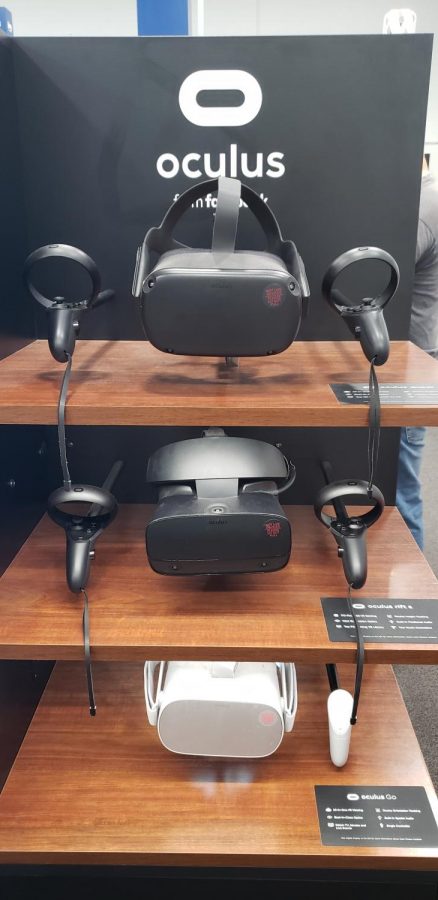Virtual reality: changing humanity into a simulation
A customer views the virtual reality headsets available at Best Buy.
March 13, 2020
Telling apart a dream from reality and telling apart virtual reality from actual reality is becoming more difficult; the differences between knowing which one is which between these two scenarios continues to decrease.
Technology is advancing to the point where we can’t tell what is real and what is just an image being displayed. Is it developing too far to the point where we have to stop or do you think we should keep on going and make the movie “Ready Player One” reality?”
Although the esports team here at Middle College High School only plays video games on laptops, they are still part of the “gamer” society. Ever since gaming in virtual reality took over the scene in 2010, the idea of what should be developed has changed drastically. From better controllers to full-body suits and even simply changing to wireless or better graphics, who knows where virtual reality is headed in the years to come.
Sophomore Darren Leang who plays “League of Legends” on the esports team anticipates that virtual reality is the next step in video game history.
“Gaming is at a high right now in the sense that it is developing in a way we never thought it would. With things like the Oculus Quest being introduced, gaming in virtual reality is really taking over,“ said Leang.
The Oculus Quest is the first virtual headset of its kind. It was created by Oculus VR, a division of Facebook Inc., and is the first fully standalone virtual reality headset. This means that the headset and controllers are not connected to a pc, unlike the other virtual reality headsets.
Playing video games is not the only application of virtual reality. Jang Ji-sung, a South Korean mother who lost her 6-year-old daughter to leukemia, used virtual reality to look at a picture-perfect hologram of her daughter. While some may think that this is a bad idea because she will become attached to the hologram, others believe that this is actually beneficial to someone’s mental health.
Middle College teacher Mr.You is also a parent and doesn’t really like the idea of loving a hologram.
“I would never use virtual reality to look at someone that is deceased because I personally think it is pretty creepy. I think I will stick to my google home,” said You.
The use of holograms has both advantages and disadvantages. As it gets closer and closer to simulating reality, issues regarding morality begin to grow.
“If my daughter were to ever keep a memory of me, I hope she sticks to old memories or photos instead of trying to make new ones with a hologram made by some code. I also hope people don’t depend on virtual reality in this sense because they might become too attached to a hologram that they forget to make actual human connections,“ said You.






































